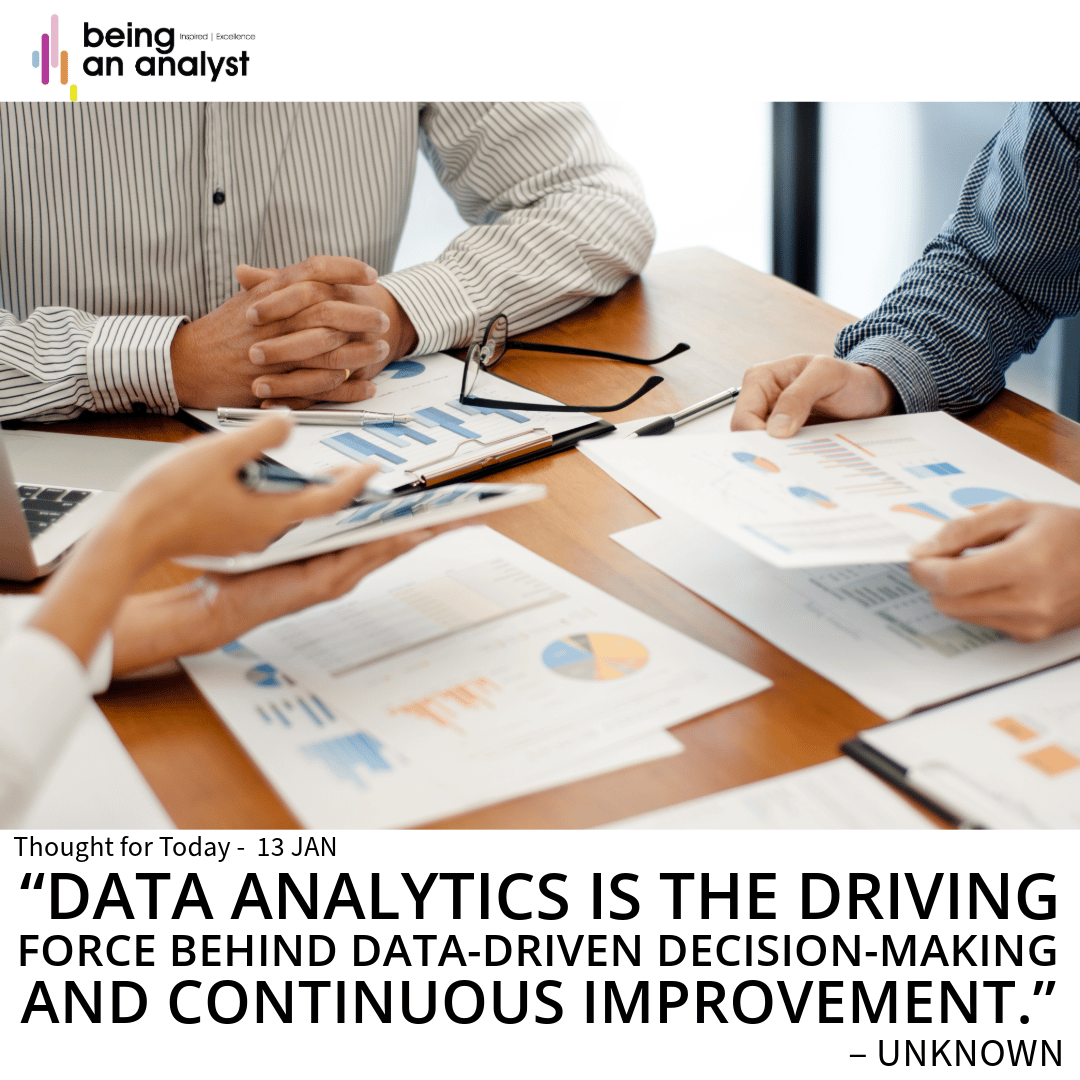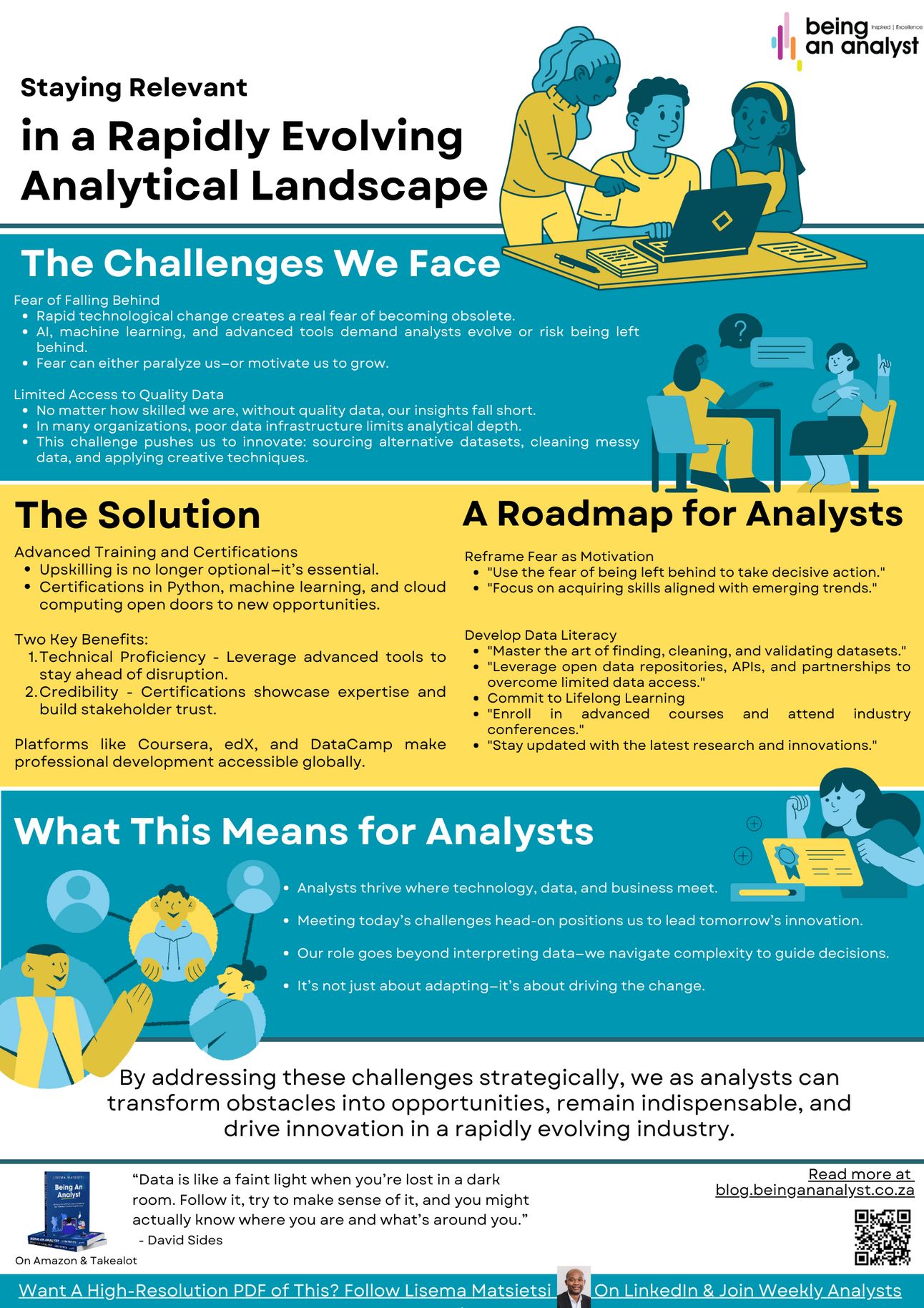- The Weekly Analyst
- Posts
- Turning Fear of Obsolescence into Analytical Excellence
Turning Fear of Obsolescence into Analytical Excellence
The Weekly Analyst Newsletter: Monday Edition

Sneak Peak: As analysts we must embrace change by reframing the fear of being left behind as motivation to evolve with emerging tools and technologies. Limited access to quality data presents challenges but encourages innovation, requiring analysts to develop skills in sourcing, cleaning, and leveraging alternative datasets. Continuous learning and certifications in machine learning, cloud computing, and programming languages are essential for staying competitive and enhancing technical proficiency and credibility. By addressing these challenges strategically, analysts can transform obstacles into opportunities, remain indispensable, and drive innovation in a rapidly evolving industry.

Turning Fear of Obsolescence into Analytical Excellence
We often find ourselves in a work environment marked by rapid technological change. What was once a reliable way of working is now becoming outdated. Tools and techniques that were innovative just a few years ago are at risk of becoming obsolete, leading to a growing fear among our teams of being left behind. This apprehension is evident in our team meetings, where there is resistance to trying new methods.
In addition to technological changes, we face other significant challenges. The lack of access to reliable data sources and advanced training programs further complicates our situation. However, this combination of challenges—technological disruption, limited data access, and the necessity for upskilling—also presents a valuable opportunity for growth if we approach it strategically.
Key Takeaways
We must embrace change by reframing the fear of being left behind as motivation to evolve with emerging tools and technologies.
Limited access to quality data presents challenges but encourages innovation, requiring analysts to develop skills in sourcing, cleaning, and leveraging alternative datasets.
Continuous learning and certifications in machine learning, cloud computing, and programming languages are essential for staying competitive and enhancing technical proficiency and credibility.
By addressing these challenges strategically, we as analysts can transform obstacles into opportunities, remain indispensable, and drive innovation in a rapidly evolving industry.

The Challenge - Fear of Being Left Behind
For many analysts I met through the mentorship programme, the fear of falling behind is real and justified. With the rise of artificial intelligence, machine learning, and advanced analytics tools, the data manipulation skillsets of today no longer guarantee relevance tomorrow. Analysts who fail to adapt risk being outpaced by automation or peers who have embraced new methods. Yet, this fear can become a catalyst for progress. How? It serves as a reminder that our value as analysts lies not in clinging to what we know, but in evolving alongside the technology and tools shaping our industry.
The Barrier - Limited Access to Quality Data Sources
Even the most skilled analyst is only as effective as the quality of the data we can access. Poor access to reliable, timely, and comprehensive datasets remains a significant barrier for us. This is particularly true in regions or organisations with underdeveloped data infrastructures. Without strong datasets, our analyses risk being superficial, missing the depth and nuance decision-makers rely on. However, the challenge of data access also forces us to innovate. How? There is an increasing need for analysts who are skilled in sourcing alternative datasets, cleaning messy data, and applying creative techniques to extract insights that stand out in today’s landscape.
The Solution: Access to Advanced Training and Certifications
To stay ahead of the curve, analysts must invest in continuous professional development. Certifications in data analysis, machine learning, cloud computing, and programming languages like Python or R are no longer "nice-to-haves"—they are essential.
The benefits of enrolling in these advanced training provides two critical advantages:
Technical Proficiency - Mastering advanced tools and methods allows analysts to leverage new technologies instead of fearing them.
Credibility - Certifications signal expertise and dedication, making analysts more competitive in the job market and more trusted by stakeholders. Thankfully, access to advanced training is becoming more democratised. Online platforms such as Coursera, edX, and DataCamp, along with certifications like Google Data Analytics or AWS Cloud Practitioner, provide flexible learning opportunities for analysts across the globe.
Connecting the Dots
When we link the fear of being left behind, limited access to data sources, and the pursuit of advanced certifications, we uncover a roadmap for analysts to remain indispensable:
Reframe Fear as Motivation - Fear of falling behind can drive analysts to act decisively. Rather than dwelling on the challenges, focus on acquiring skills that align with emerging industry trends.
Develop Data Literacy - Analysts must learn to navigate limited data access by becoming proficient in finding, cleaning, and validating alternative datasets. This includes leveraging open data repositories and APIs or developing partnerships to access proprietary datasets.
Commit to Lifelong Learning - Enrol in advanced courses, attend industry conferences, and stay updated with the latest research. Knowledge is a competitive advantage in a rapidly evolving field.
What Does This Mean for Analysts?
Our analyst profession has always flourished at the crossroads of technology, data, and business insight. Nowadays, the stakes have never been higher, presenting unprecedented opportunities. Those who meet these challenges head-on, take charge of our development and consistently enhance our skills will not only adapt to change—we will drive it. Our responsibilities extend beyond mere data interpretation; we serve as a guide through intricate situations. Although concerns regarding irrelevance, restricted data availability, and the need to upskill can seem daunting, these are the very elements that will shape the analysts of tomorrow. It’s not merely about keeping up—it’s about charting the course.

Get Private Banking Previledges Today

What It Means for You – Your Fear of Being Left Behind by Rapidly Advancing Technology?
I believe that as we move further into 2025, the rapid advancement of technology, especially artificial intelligence (AI), will continue to spark both excitement and anxiety. Many fellow South Africans and colleagues are asking questions like:
Will my job still exist in the next five years?
How can I keep up when everything is changing so quickly?
This fear is not unique to South Africa; it’s a global concern. However, addressing these fears starts with understanding the realities of technological change and what it means for us all… Read More
Limited Access to Quality Data – A Barrier to Insightful Analysis
In our data-driven world of analysis, the availability of quality data has proven to be crucial. We have seen how this has been impacting our insights. Yet, many of us face the challenge of limited access to reliable data sources. This constraint not only hampers the quality of our insights but also affects decision-making processes across industries. Understanding and addressing common data quality issues is essential for our organisations and individuals striving to produce meaningful analytical insights… Read More

How Can I Help Grow This Community?
We have been asked this question frequently by most patrons who see the work that we do and appreciate the time and effort invested so that you can be inspired to be an excellent expert analyst. There are many ways to help us grow into an effective organisation that develops expert analysts;
Encouraging co-workers and friends to subscribe to our bi-weekly newsletter to learn more about being an effective analyst.
Buying a 'Being An Analyst' book which is an essential guide to becoming not just an analyst, but a catalyst for success and a driver of organisational change from Amazon, Takealot, or books.beingananalyst.co.za
Train your team or engage your audience with analysis concepts and elevate their knowledge, decision-making and productivity. Reach out here for training and here for speaking.
Grow your business with short-term, medium-term, and long-term analytics-based planning, monthly reporting, and big-picture data models so you’re always future-ready.
Sponsor a future issue of the ‘Weekly Analyst’ newsletter
Why Buy ‘Being An Analyst’ Book?
'Being An Analyst' is your essential guide to becoming not just an analyst, but a catalyst for success and a driver of organisational change. Order your copy Today!!
This book is the definitive guide to unlocking the transformative potential of informed decision-making and supercharging your analytical skills. Whether you're a budding analyst or a seasoned pro, this book is your ticket to becoming a catalyst for success and a driving force for change within your organisation.







Reply